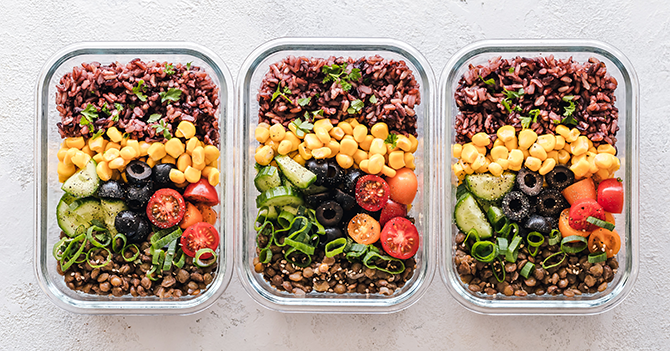Hidden Ingredients in Sugar Free Sauces: What to Watch Out For
Hidden Ingredients in Sugar Free Sauces: What to Watch Out For
Blog Article
All Regarding Healthy Food: Advantages of Embracing Plant Based Options
The conversation bordering plant-based diet regimens has acquired significant attention in recent times. Many people are discovering the possible wellness benefits, dietary benefits, and environmental impacts connected with these nutritional options. As people come to be a lot more mindful of their food's influence on well-being and sustainability, concerns develop concerning the practicalities of taking on such a way of life. What specific modifications can one anticipate, and how might these options improve not just individual health but likewise the world's future?
Understanding Plant-Based Diet Regimens
Although lots of people associate plant-based diet plans mostly with vegetarianism or veganism, these diet plans can incorporate a vast array of eating patterns that prioritize entire, minimally processed plant foods. Such diets typically include fruits, veggies, whole grains, beans, seeds, and nuts, while limiting or removing animal items. This versatility allows individuals to customize their dietary options according to dietary needs and individual choices. Some might embrace a mostly plant-based diet plan while still occasionally consuming meat or dairy, frequently described as a flexitarian technique. The focus remains on including more plant foods, which can bring about a varied variety of flavors and dishes. Recognizing these different interpretations of plant-based consuming is vital for valuing its access and charm in contemporary food culture.
Wellness Conveniences of Plant-Based Foods
The health and wellness benefits of plant-based foods are substantial, offering a nutrient density advantage that supports general health. Study suggests that these foods can improve heart health and wellness and play a vital role in reliable weight management. By integrating extra plant-based options, individuals might boost their dietary choices and promote lasting health and wellness.
Nutrient Thickness Benefit
Nutrient density plays an essential role in the health and wellness benefits of plant-based foods, making them a compelling selection for those looking for a well balanced diet regimen. Plant-based foods, such as fruits, veggies, beans, nuts, and entire grains, are frequently rich in vital vitamins, minerals, and antioxidants while being lower in calories. This high nutrient density enables individuals to consume less calories while still satisfying their dietary requirements. Furthermore, these foods are loaded with dietary fiber, advertising digestive health and wellness and assisting in weight administration. By integrating nutrient-dense plant-based alternatives, consumers can boost their overall health, sustain their body immune systems, and lower the threat of persistent conditions. Inevitably, the nutrient thickness of plant-based foods highlights their relevance in a health-conscious way of living.
Heart Health And Wellness Renovation

Weight Administration Support
In enhancement to advertising heart wellness, a plant-based diet can substantially assist in weight management. This nutritional method stresses entire foods such as fruits, veggies, beans, nuts, and whole grains, which are typically lower in calories and higher in fiber contrasted to animal-based products. The high fiber content assists enhance satiation, reducing general calorie intake. Additionally, plant-based diet plans are usually abundant in crucial nutrients while reduced in unhealthy fats, making it less complicated to keep a healthy weight. Plant Based Chicken. Study indicates that individuals that embrace a plant-based lifestyle tend to have lower body mass indexes (BMIs) and experience even more successful weight-loss compared to those that consume meat-heavy diet regimens. Accepting plant-based alternatives is a critical selection for effective weight monitoring.
Nutritional Value of Plant-Based Ingredients
Plant-based ingredients are abundant in vital nutrients, using a diverse selection of vitamins, minerals, and anti-oxidants that add to total health and wellness. A comparison of protein resources reveals that while animal items are frequently considered as premium, many plant-based alternatives offer sufficient healthy protein and other valuable compounds. Comprehending the dietary value of these ingredients can aid people make informed dietary choices.
Essential Nutrients in Plants
Nutrient-rich components located in plants supply a varied selection of important vitamins and minerals that contribute greatly to general health and wellness. These components are abundant in vitamins A, C, and K, which support immune function, vision, and blood clot, specifically. Additionally, plants provide essential minerals such as magnesium, calcium, and potassium, critical for heart wellness, muscle feature, and bone toughness. The presence of fiber in plant-based foods help food digestion and advertises a healthy and balanced intestine microbiome. Antioxidants, found perfectly in veggies and fruits, assistance battle oxidative stress and decrease inflammation. Many plant foods are low in calories yet high in nutrients, making them an exceptional choice for those looking for to maintain a healthy and balanced weight while ensuring suitable nutrient consumption.

Comparing Healthy Protein Resources
Healthy protein sources differ significantly in their dietary profiles, with plant-based ingredients using distinct advantages. Unlike pet healthy proteins, which often consist of saturated fats and cholesterol, plant healthy proteins have a tendency to be lower in these unhealthy elements. Legumes, nuts, seeds, and whole grains are rich in essential amino acids, fiber, vitamins, and minerals. Lentils supply high protein web content along with considerable iron and folate, while quinoa is a complete healthy protein, providing all nine necessary amino acids. In addition, plant-based proteins are often gone along with by antioxidants and phytochemicals that support overall wellness. The shift to plant-based healthy protein sources not just boosts nutritional consumption but additionally aligns with lasting dietary practices, reducing ecological effect and promoting long-lasting wellness benefits.
Ecological Influence of Plant-Based Eating
As recognition of climate adjustment expands, numerous individuals are discovering sustainable nutritional options that can significantly decrease their ecological footprint. Plant-based eating has become a substantial contributor to reducing greenhouse gas discharges, which are largely related to livestock production. The cultivation of fruits, vegetables, veggies, and grains commonly calls for fewer sources, such as water and land, contrasted to animal farming. In addition, plant-based diets can bring about lowered logging, as less land is required for grazing livestock or expanding pet feed. By shifting towards plant-based options, customers can support biodiversity and promote healthier environments. On the whole, embracing plant-based eating not only advantages individual wellness but additionally stands for an important step towards ecological sustainability and conservation efforts.
Conquering Common Misconceptions
While many individuals identify the benefits of a plant-based diet, numerous mistaken beliefs typically prevent them from totally accepting this lifestyle. A common idea is that plant-based diets do not have adequate protein; nonetheless, many plant sources, such as vegetables, nuts, and tofu, provide enough healthy protein. Furthermore, some assume that this diet plan is pricey, when in fact, staples like beans, rice, and seasonal vegetables can be quite affordable. An additional misunderstanding is that plant-based consuming is excessively limiting, whereas it actually supplies a varied selection of flavors and foods. Numerous stress that a plant-based diet plan might lead to shortages, yet with correct preparation, individuals can get all necessary nutrients, including minerals and vitamins, while delighting in a wide variety of scrumptious dishes. Large Tips for Transitioning to a Plant-Based Way of life
Making the shift to a plant-based way of life can be an enriching experience, though it typically calls for some assistance to browse the first changes. First, individuals are urged to begin progressively, integrating more fruits, veggies, beans, and whole grains into their meals while reducing meat and milk usage. Dish preparation is crucial; preparing a regular food selection can help alleviate the change and prevent have a peek here last-minute undesirable choices. Discovering brand-new recipes and cooking approaches can likewise improve the experience and maintain excitement regarding plant-based consuming. Additionally, joining support system or neighborhoods can give motivation and share useful pointers. Ultimately, staying informed regarding nourishment warranties balanced dishes, stopping deficiencies while promoting a healthy, satisfying plant-based way of life.
Delicious Plant-Based Dish Concepts
Discovering delicious plant-based dish ideas can motivate individuals to accept an extra nourishing diet regimen. One popular choice is a hearty quinoa salad, featuring cherry tomatoes, cucumber, and a tangy lemon-tahini dressing. An additional fave is a tasty lentil stew, packed with carrots, celery, and aromatic herbs, perfect for a calming supper. For breakfast, overnight oats made with almond milk, chia seeds, and covered with fresh berries offer a nourishing beginning to the day. Furthermore, a websites vibrant veggie stir-fry with tofu and a variety of colorful veggies can be a fast yet pleasing meal. Finally, luscious avocado toast on whole-grain bread, sprinkled with seeds and seasonings, supplies a simple yet savory snack. These dishes display the variety and richness of plant-based eating.

Often Asked Concerns
Can a Plant-Based Diet Plan Provide Enough Healthy Protein?
The concern of whether a plant-based diet can supply enough protein is usual. Various resources, including beans, nuts, seeds, and whole grains, can meet healthy protein requires effectively, sustaining a healthy and well balanced diet plan for individuals.
Are Plant-Based Diet Regimens Appropriate for Children?
The viability of plant-based diet regimens for youngsters relies on cautious preparation. Adequate nutrients have to be guaranteed, consisting of healthy proteins, minerals, and vitamins. With appropriate advice, such diet plans can support healthy and balanced growth and growth in youngsters.
Just how Do I Eat in restaurants on a Plant-Based Diet plan?
Dining out on a plant-based diet entails seeking restaurants with diverse menus, requesting for alterations, and exploring vegan-friendly options. Planning ahead and communicating nutritional choices can enhance the dining experience while preserving dietary choices.
What Prevail Allergens in Plant-Based Foods?
Usual allergens in plant-based foods consist of soy, gluten, nuts, and seeds - Gluten Free BBQ Sauce. People following a plant-based diet plan must know these allergens and read tags thoroughly to avoid damaging responses and guarantee secure intake
Can Plant-Based Diets Aid With Weight-loss?
Study shows that taking on a plant-based diet regimen may promote weight reduction due to its generally lower calorie density and higher fiber web content. This combination can enhance satiety, helping individuals handle their caloric intake effectively. Lots of people associate plant-based diets primarily with vegetarianism or veganism, these diets can incorporate a large array of eating patterns that prioritize whole, minimally refined plant foods. Nutrient density plays an essential role in the health benefits of plant-based foods, making them an engaging choice for those looking for a well balanced diet plan. Plant-based diet plans have been revealed to considerably boost heart health, as they commonly include elements that support cardiovascular feature. In enhancement to promoting heart health, a plant-based diet can considerably aid in weight administration. A common idea is that look at this web-site plant-based diet regimens lack sufficient protein; however, countless plant resources, such as beans, nuts, and tofu, offer adequate protein.
Report this page